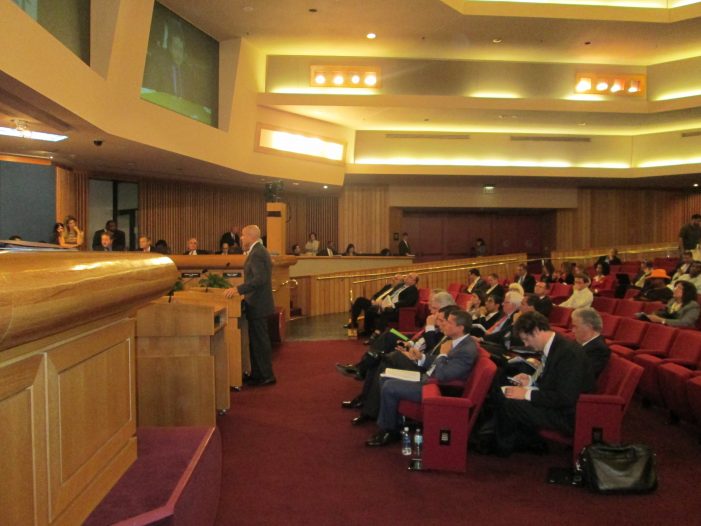Despite what the Miami Dolphins say on their website — that “nearly five hours of debate yielded a favorable vote” — there really was no debate before the Miami-Dade Commission gave preliminary approval Wednesday to a hotly-negotiated, “unprecedented” deal that will give the team’s owners a revenue stream of nearly $300 million to fix up the stadium.
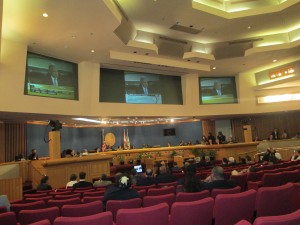
Commissioners also passed a referendum on the matter for May 14 letting the people ultimately decide — that’s even if the state legislature approves the increase (not addition) to tourist bed taxes (more on that later) and $3 million a year in state tax rebates (which is not tourist money but our money) in addition to the $2 million they already get.
With the Marlins stadium stink heavy in the air, no matter how hard the Dolphin people try to cast themselves as a “different fish,” Chairwoman Rebeca Sosa talked about having confidence in Mayor Carlos Gimenez, in the voters and in letting the people decide.
“I won’t say if I’m completely endorsing it or not,” Sosa said about the deal, adding that one of the main complaint after the Marlins deal was that the financing agreement was not put on a ballot for the people to decide.
“At the end of the day, this is a vote of confidence for the the votersof Miami-Dade County,” Sosa said.
But she didn’t let the people talk. At least not all of the people. Just the pro-stadium deal people.
Sosa told Ladra Thursday the same thing she told Cutler Bay Mayor Ed “Mac” MacDougall — who has spoken against what he says is welfare for billionaires — Wednesday morning: that the special meeting could not be a public hearing because there was not enough time to advertise or publicly announce a public hearing, as required by law. Sosa also told me that was the opinion of the county attorney. But Ladra suggests that some brave commissioner make it an issue so that if you call a special meeting of such importance, with the public notice you need (from Monday to Wednesday), that the public hearing advisory also be shortened. You know, only in cases of such emergencies.
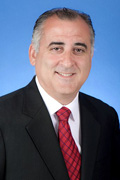
And I am openly suggesting it to Commissioners Xavier “Mayor Sir” Suarez or Esteban Bovo, both of them voted against the deal and against the referendum. (That means you, X. Stevie doesn’t read el Cortadito.)
Why on Earth would anyone be against a referendum? Ladra understands that question that she herself has been asked because, for the first time in my life, I find myself there. And it’s not what is on this referendum. It is what is noton there and how the process has played out so far. And what I fear is a campaign storm coming ahead (more on that later). And because Ladra sort of agrees with Bovo, of all people (and I do understand why he doesn’t talk to me), when he said the board was passing the buck, acting like Pontius Pilate and “wiping our hands clean.”
“Yeah, it gies us political cover,” he said, and, yes, it makes me wince to like him but he’s saying a bunch of smart things up there. Listen: “But I’m not sure this is what they elected us to do.”
He also questioned the short window of time and the wording on the ballot (more on that later), which were among the issues that maybe someone in the public might also raise.
But neither I nor Mayor MacDougall nor anyone else was able to raise any questions publicly Wednesday or speak to those issues because there was no debate, no discourse. There will be one, and only one, on May 7th, about two weeks after the absentee ballots drop and waaaay after the multi-million dollar campaign for pro-stadium boosters (which Ladra suspects includes the county, despite all the assurances) launch their spin cycles.
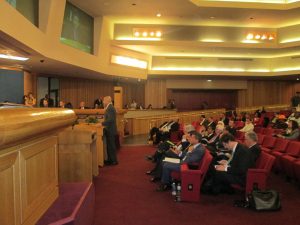
Which was yesterday.
Because while it was not a public hearing, the nearly five-hour meeting did feature a parade of pro-stadium cheerleaders urging the commission to pass this deal for the benefit and betterment of our community. The string of boosters included the Dolphins’ CEO Mike Dee, Super Bowl Committee King Rodney Barretto, and William Talbert, president and CEO of the Greater Miami Visitors and Convention Bureau.
“The participants involved had to speak to bring the proposal to the board,” Sosa told me.
Oh, wait, and there was also ex-Dolphin Nat Moore, speaking on behalf of all they do in the community (which is, indeed, a lot), some hotel industry representatives and the impromptu cameo of Miami Gardens Mayor Oliver Gilbert, who called the resolution’s sponsor, Commissioner Barbara Jordan, on her cellphone while she was on the dais about some amendment to use more off-duty Miami-Dade Police at events than those from other agencies. That would cost the city more than using Miami Gardens Police, Gilbert said. So he was opted out.
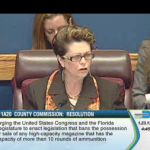
But it was not a public hearing.
“I cannot control when another commissioner calls someone to speak,” Sosa told me, passing the buck again, like she is doing with the referendum vote, and blaming the Marlins fallout.
Maybe she did not recognize that maybe there was an opportunity after Gilbert, an unscheduled speaker, came to the podium, to allow MacDougall some time to make his case or ask important questions before the vote is made and the language set and the ballots mailed. Or at least to try.
Mayor MacDougall was almost as upset as Ladra at what looked to me like una falta de respeto.
“She was very cordial and very nice when she told me ‘No one is going to speak.’ She said the law doesn’t allow public comments because they couldn’t announce it,” McDougall said. “Then they have the Dolphin people parade in front of them.
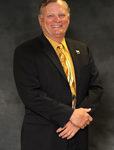
“If no one gets to speak, no one gets to speak,” MacDougall told me, the morning after he watched the parade from the front row, sitting next to the Dolphins attorney.
“I was just flabbergasted. I was speechless,” he said. “What I saw yesterday was five hours of a one-side conversation. They say they want transparency, and while they’re doing this, they’re shutting the public out.”
MacDougall called it a “blackout” and said it was “a preview of what’s to come.” Even though Sosa and Mayor Carlos Gimenez, who brokered what he boasts will become a national model of public/private agreements, say their informational outreach will be impartial, both MacDougall and I doubt it will have much context — just like Wednesday’s meeting.
And will there be any way to reverse the action — you know, rewrite the language or unsend the ABs or nix the whole scam in the first place — after the first public hearing, which is a week before the special election and two weeks after ABs hit the streets? Probably not. So will a lot of people go? Was that by design?
“I don’t think the commission and the mayor want to be blasted publicly on the dais,” MacDougall said. “They just wanted a flower show. And that’s what they got.”
And I suspect that may be what the public gets from the boosters in what will be a powerful campaign: A parade of flowers.

